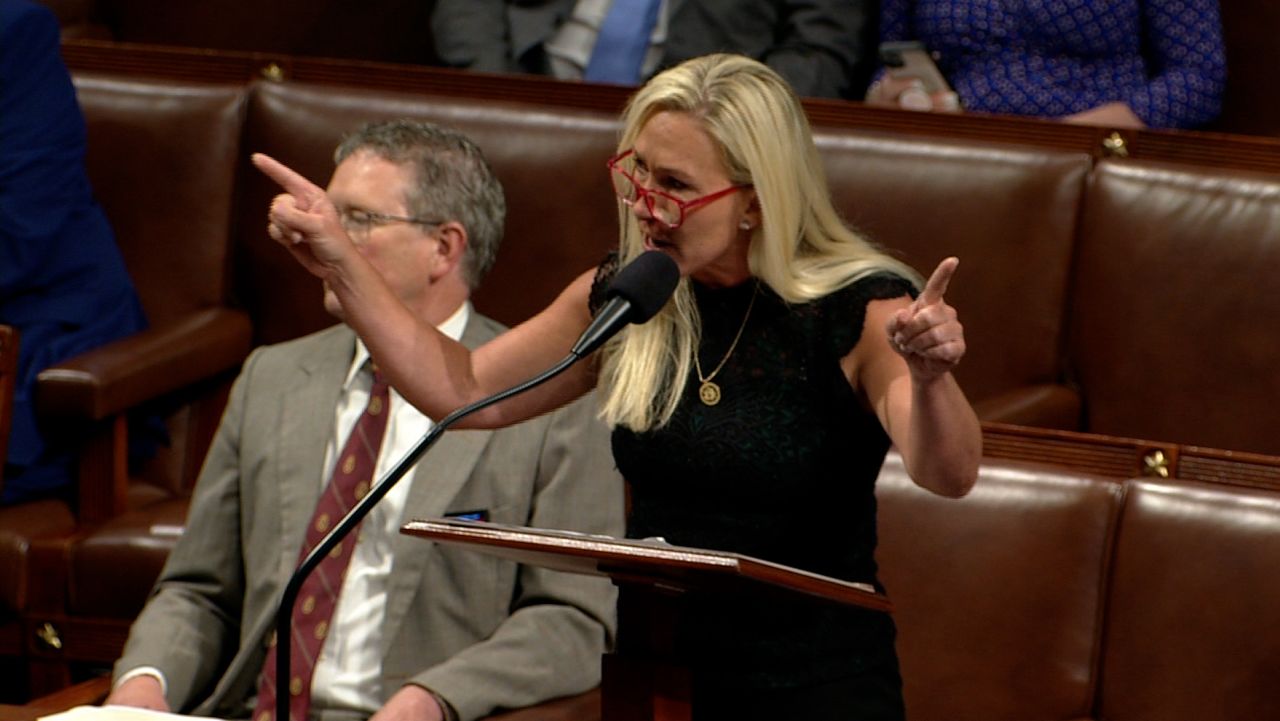Marjorie Taylor Greene’s Rhetoric and Its Impact on Modern Politics

Marjorie Taylor Greene, a prominent figure in the Republican Party and an ardent supporter of former President Donald Trump, has become known for her fiery rhetoric and controversial statements. Recently, her remarks at a Turning Point Action event have sparked significant debate and concern. Greene’s statements, which included cursing and vehement criticism of political opponents, reflect a broader trend in American politics, marked by heightened polarization and increasingly aggressive language.
Greene’s Support for January 6th Insurrectionists
At the Turning Point Action event, Greene vocally supported the individuals involved in the January 6th Capitol riot, referring to them as “hostages” and condemning those who criticize their actions. “That’s right,” Greene declared, “and any Democrat and any person from the mainstream media and anyone that wants to continue to shame us for January 6th can go to hell.” This statement was met with applause, illustrating the deep divide in public opinion regarding the events of January 6th and the treatment of those involved.
Attacks on Political Figures and Institutions
Greene’s speech did not stop at defending the insurrectionists. She directed sharp attacks at Manhattan District Attorney Alvin Bragg, whom she called “pathetic trash” and accused of fabricating charges against Trump. Greene’s disdain for Bragg and her vehement defense of Trump highlight the intense loyalty she and her supporters have for the former president, as well as their suspicion and hostility towards legal authorities perceived to be against him.
Criticism of Dr. Anthony Fauci
In a particularly inflammatory segment of her speech, Greene turned her ire towards Dr. Anthony Fauci, a respected immunologist who played a key role in the U.S. response to the COVID-19 pandemic. Greene accused Fauci of crimes against humanity, a claim that was met with chants of “lock him up” from the audience. She reiterated her belief that the virus was engineered in a lab in Wuhan, China, a theory that has been widely debated and remains unproven.
The Broader Impact on Political Discourse
Greene’s rhetoric is part of a broader trend in American politics, where aggressive and often inflammatory language has become more commonplace. This shift is not limited to Greene; former President Trump himself has been known for his provocative and sometimes vulgar language. At various events, Trump has used coarse language to describe his opponents and to galvanize his supporters, contributing to a political climate where such rhetoric is increasingly normalized.
Media Normalization and Public Reaction
The normalization of aggressive political rhetoric by some media outlets and political figures raises concerns about its impact on public discourse and democracy. Critics argue that this kind of language undermines civil debate and fosters division. Despite this, figures like Greene and Trump maintain significant support, suggesting that a portion of the electorate is not only untroubled by this rhetoric but actively energized by it.
The Role of Commercial Interests
Another noteworthy aspect of the event was the commercial angle. Promotional materials and products, such as the “Freedom To-O” water brand, were marketed to the audience, blending political messaging with consumerism. Trump himself has been involved in similar ventures, including selling branded Bibles and other merchandise. This fusion of politics and commercialism further complicates the political landscape, where ideological alignment is often intertwined with consumer behavior.
Trump’s Outreach and Controversial Associations
Trump’s recent outreach efforts, including events aimed at the Black community, have also drawn scrutiny. Notable appearances by controversial figures such as former Detroit Mayor Kwame Kilpatrick, who was convicted of fraud and racketeering, have been criticized as cynical attempts to court votes. Similarly, Trump’s past events have featured other contentious figures, raising questions about his commitment to genuine outreach versus opportunistic alliances.
Conclusion
Marjorie Taylor Greene’s recent statements at the Turning Point Action event exemplify the current state of political discourse in the United States, characterized by extreme rhetoric and deep polarization. Her unapologetic support for January 6th insurrectionists, harsh attacks on political figures, and controversial comments on public health experts reflect a broader trend within certain segments of the Republican Party. This shift towards more aggressive and combative language, while energizing a base of loyal supporters, poses significant challenges for the future of civil political debate and the health of American democracy. As the political landscape continues to evolve, the impact of such rhetoric on public discourse and democratic institutions will remain a critical area of concern and analysis
News
‘ VIDEO ‘ Leaked Information Benavidez Surrendered After Receiving 2 Punches In The Nose From Canleo Alvarez ️ ️🥊✊ FULL VIDEO 👇👇
In an unexpected twist that has sent shockwaves through the boxing community, leaked information reveals that David Benavidez allegedly surrendered after receiving two powerful punches to the nose from Canelo Álvarez. The news, which emerged from a confidential source, has…
Mike Tyson Was ‘Knocked Out’ By Jake Paul After Just 2 Punches! Information Leaked.. 😱 🥊 FULL VIDEO 👇
In a stunning revelation that has taken the boxing world by surprise, leaked information suggests that the legendary Mike Tyson was “knocked out” by YouTube star-turned-boxer Jake Paul after just two punches. The news, originating from an undisclosed source, has…
Video Of Tyson Fury Successful When Only 4 Punches Killed Usyk In The Rematch Earlier Than Expected FULL VIDEO 👇👇
In an unprecedented turn of events, a video has surfaced showing Tyson Fury achieving a stunning victory over Oleksandr Usyk in their highly anticipated rematch. The footage, which has quickly gone viral, reveals that Fury managed to defeat Usyk with…
“HE’S 🐁” – Naoya Inoue Angrily Criticized Tank Davis For Being Cowardly For Not Accepting Defeat Due To His Own Ability
In a heated exchange that has sent shockwaves through the boxing community, Naoya Inoue has publicly criticized Gervonta “Tank” Davis, accusing him of cowardice for not accepting defeat due to his own abilities. Inoue’s harsh words came during a recent…
Terence Crawford Has No Doubt Who Shakur Stevenson’s Toughest Opponent Will Be
Terence Crawford has seen the skillset of Shakur Stevenson up close and personal. The two world champions are friends and occasional sparring partners despite the difference in weight, often sharpening their tools ahead of high-level title bouts. Stevenson is currently…
Gervonta Davis Talked Continuously During Heated Press Conference Faceoff Frank Martin, Proving Mike Tyson Mocking Tank Davis is ‘talkative woman’
The tension was palpable at the recent press conference faceoff between Gervonta “Tank” Davis and Frank Martin, but what stood out most was Davis’s continuous talking throughout the event. This relentless chatter seemed to reinforce Mike Tyson’s previous mockery of…
End of content
No more pages to load











